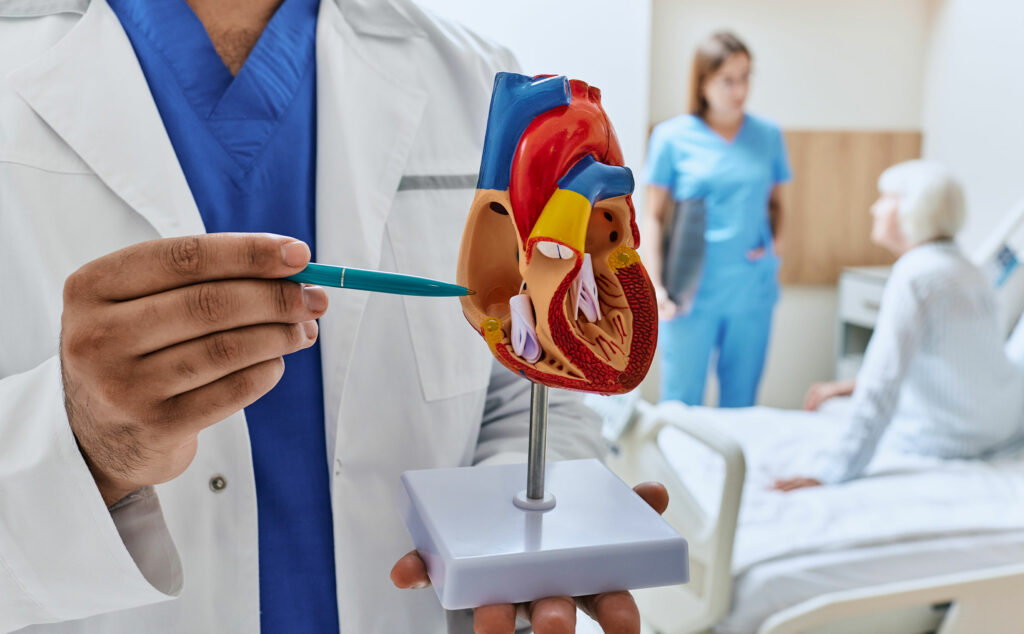Ischemic heart disease, is a pathology resulting from atherosclerosis of the coronary arteries, this means that there is a narrowing or blockage in these arteries.
Coronary atherosclerosis is a slow process that initially does not have symptoms, where collagen, fats (lipids), and inflammatory cells (lymphocytes) accumulate, resulting in stenosis (narrowing of the coronary arteries).
Although this accumulation process, which is a heart disease, can begin at a very young age, it usually does not have symptoms until the narrowing of the coronary artery becomes severe and causes a decompensation of the oxygen supply to the heart and the amount needed.
Causes of ischemic heart disease
Different causes can lead to ischemic heart disease, among which the following risk factors are included:
- Family history of ischemic heart disease, leading to congenital heart disease
- Increased LDL, bad cholesterol
- Diabetes
- Decreased HDL, good cholesterol
- Age
- Smoking
- Having previously had this type of disease.
- High blood pressure
- Obesity
- Sedentary lifestyle
- Being a man, although women after menopause equal the risk
If a person has multiple risk factors, their probability of suffering from this type of disease will increase.
Three cardiac pathologies can occur before ischemic heart disease:
- Myocardial infarction. It occurs due to the obstruction of a coronary artery by a thrombus. The main symptom is having chest pain for more than 20 minutes.
- Stable angina. Pathology that usually occurs after making a physical effort or after having an intense emotion, although it also has chest pain, it usually lasts between one and 15 minutes.
- Unstable angina. It usually does not present a complete occlusion in the coronary artery, but because of this, it can be a very high alert for sudden death or acute myocardial infarction.
Ischemic heart disease treatment
After the patient has symptoms and the doctor has diagnosed the presence of angina or myocardial infarction, the patient must remain at rest and in the hospital.
There are different treatments to follow depending on the type of condition.
- Medication. Different medications can be indicated such as aspirin, anticoagulants, beta-blockers, and antiplatelet agents, among others; each one has a particular function that the doctor will seek to cover.
- Surgical treatments. If necessary, the doctor can recommend other more invasive treatments such as angioplasty or percutaneous revascularization, there is also the possibility of using a coronary catheterization or a bypass.
On the other hand, patients who have already suffered ischemic heart disease and were treated immediately must follow long-term treatment to prevent angina or myocardial infarction from recurring, this includes:
- Modify your lifestyle with a healthier diet, exercise, stop smoking, and control all risk factors.
- Using the pharmacological treatment prescribed correctly.
- Follow-up tests if the doctor requests them to keep the patient under control.
It is important to emphasize that the treatment is individual, so it is vitally important to follow the doctor’s instructions and not do anything that is not in the prescribed treatment.
Learn about the AMI Code (Acute Myocardial Infarction) of the ABC Medical Center’s Cardiovascular Center, where ischemic heart disease and other heart problems can be treated, we can provide you with specialized care. Contact us!
Fuentes:
https://www.paho.org/es/temas/enfermedades-cardiovasculares#:~:text=La%20enfermedad%20isqu%C3%A9mica%20del%20coraz%C3%B3n,los%20vasos%20sangu%C3%ADneos%20por%20aterosclerosis
https://fundaciondelcorazon.com/informacion-para-pacientes/enfermedades-cardiovasculares/cardiopatia-isquemica.html
https://www.clinicbarcelona.org/asistencia/enfermedades/cardiopatia-isquemica/tratamiento


